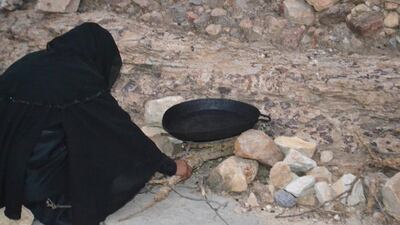ADEN // At only 16 years old, Suha had not thought about marriage until her father told her she would become the second wife to a man 20 years her senior.
Suha’s father Abdulbari Al Maqtari, 41, said he had no choice but to marry off the eldest of his four daughters and two sons last May to help support the family.
Mr Al Maqtari, from Al Maqatra district in Lahj province, used to be a construction worker but has struggled to find work after civil war broke out in Yemen two years ago.
“I got 500,000 Yemeni rials [Dh7,341] as dowry for Suha that we are still using now to support the family. Suha is not the only one to be married at her age. Some girls get married when they’re even younger than her, and I do not blame their parents.”
A national demographic and health survey in 2013 found that nearly 32 per cent of girls in Yemen were married before the age of 18, including 9.4 per cent who were wed before they were 15. Of these, 8.1 per cent had given birth before they turned 19.
A survey by the United Nations Population Fund (UNFPA) on child marriages in Yemen, released in November, found that a trend that was previously on the decline was rising again as families tried to cope with the hardships of war.
Mr Al Maqtari saw nothing wrong with marrying his daughter off at an early age.
“We are Muslims and Islam does not prevent us from marrying off our daughters under 18. Suha was married when she was 16, but she was qualified to be a housewife. Moreover, we are in dire need of money and people should cooperate with each other,” he said. “I am not a crazy man to force my daughter to marry if she was too young, even if I am in desperate need of money.”
Child marriage is accepted as part of Yemeni culture and widely practised in a country where there is no legal minimum age for marriage.
Before the civil war started in 2015, international and local activists had made progress towards ending the practice of child marriage. One of the outcomes of the National Dialogue Conference for political reforms in 2014 was a proposal to set 18 as the minimum age for marriage.
However, such efforts stalled after war broke out and economic conditions worsened. The economic crisis has forced many families, especially those who have been displaced, to marry off their young daughters for the sake of money.
The UNFPA report said: “Among the interviewed survivors of child marriage, the assessment showed that the average age of child marriage among girls was 15 years. In the north, 72 per cent were married between the ages of 13 and 15 years, 17 per cent between 8 and 12 years. In the south, 62 per cent of survivors had married before they reached 16 years, and 38 per cent between 16 and 17 years.”
Suha was initially reluctant to discuss her situation with strangers, but finally spoke out because she wanted other girls to understand the suffering of child brides.
“I felt shy to tell my father that I did not want to marry,” she said, “and now I am facing the bad consequences of my marriage. My husband returned to his first wife and now I am working as a servant to survive.”
She lives with her mother-in-law but receives no financial help from her husband, a property broker.
“I am pregnant now and I am suffering so much,” she said. “No one knows about my suffering and no one helps. I used to live in a poor family, but now I live in a poor family with suffering.”
Shaima Al Gabal, a social activist who works to educate communities about the negative effects of child marriage, blamed financial hardship arising from the civil war for the rise in child marriages.
“There are many problems facing the children in the midst of war, so activists, NGOs and international organisations have a lot to do to help children,” she said.
“I stopped going to school in the ninth grade and got married. Now I hope to return to school because studying is the most important thing,” Suha said.
foreign.desk@thenational.ae

